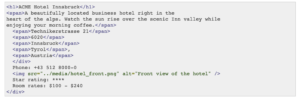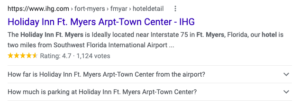How Structured Data Can Help Your Hotel’s Local SEO

As a hospitality marketer, it can be easy to get caught up in what feels like the traditional Search Engine Optimization (SEO) strategy. Optimizing page titles and meta descriptions for target keywords and generating SEO content to draw new eyes are both critical components.
But as search engines like Google have continued to evolve, local SEO has become a bigger part of the SEO equation. More and more, it seems, Google is keeping users right on the results page, making it easy to get answers (and even book rooms) without ever leaving. That has made maintaining Google My Business crucial for hoteliers. Still, while many marketers emphasize GMB and targeting local keywords, implementing structured data into a hotel website is a component of local SEO that can be easy to overlook.
Here’s why structured data matters and why hotels shouldn’t forget it.
What is structured data in the first place?
The purpose of Google’s structured data markup language (also known as schema markup) is to provide a way for websites to communicate site-relevant information to Google in a standard format. Structured data adds meaning to your website’s content in the eyes of search engine crawlers by helping them better understand the information on the page. In essence, structured data makes your hotel website more readable by algorithms and adds context.
The easiest way to think about schema markup is this: It’s a way of adding a code snippet to your hotel website’s HTML code in order to tell search engines what the content is about and highlight important information. This allows you to describe a web page by using microdata so that machines can interpret it, rather than just humans. Doing this allows search engines to do useful things with your pages, making it easier for people to find what they’re looking for. The idea is that schema allows search engines to scan a page, understand its content, and rank it for relevant searches. By including structured data markup on your website, you can help Google better understand what your intended page content actually is.
While there are a number of structured data markup languages, Google, Bing and Yahoo! partnered to develop Schema.org in 2011. Since then, it has become the de facto standard for structured data markup on the internet. Today, schema is the preferred markup language for Google’s structured data search feature, so it’s recommended to stick to it.
Why does schema markup matter?
There are two primary benefits of using schema markup on a hotel website. First, when Google’s crawlers see schema markup, they take in the information as important and it increases the chances it will be used in one of the search giant’s many dynamic features (more in a minute). Second, with the rise of voice search, structured data is becoming more and more important.
Let’s look closer at these two benefits.

Rich Snippets
One of the benefits of using structured data markup is that it provides Google with additional information about your hotel website’s content and can include ‘rich snippets.’ Think of a traditional snippet as a standard search result with a blue page link and description. A rich snippet on Google is more interactive and, depending what type of rich snippet it is, shows up at the top of the search engine results page (SERP). The bottom line is they’re more informative, look more appealing and can get better real estate. It’s no wonder data has shown they get 30% better click-through rates.
Voice Search
Meanwhile, websites that utilize schema markup have a greater chance of appearing in search results when people use voice search. Today, more than one-third of Americans have a smart assistant in their home — and many more have one right in their pocket. Apple said in 2020 that Siri fields 25 billion requests each month — and that number doesn’t include Google Assistant or Amazon Alexa. The fact is, voice search is becoming bigger and bigger each year. Structured data markup is how these assistants decipher what type of result is required (location, phone number, address, etc.). Your website needs to be able to provide this information for voice search queries.
Types of schema hotels should consider
The options for adding structured data to a website seem almost endless. Schema itself says there are 792 types in its vocabulary when you get granular, and Google offers a library of top options. For hotel websites, there is a smaller subset that hospitality marketers should focus on.
Local business information

The ‘LocalBusiness’ schema markup is the standard. Businesses across almost all industries can take advantage of this schema type to signal to search engines specific information about their business. At the most general level, that means NAP details (Name, Address, Phone), but for hotels there are industry-specific options such as number of rooms, room rates, check-in and check-out time, pet policy, and more. There is a long list of information hotels can include in their hotel’s local business markup, which will be used by Google and other search engines to provide relevant answers.
Hotel reviews

Hotels can utilize Review schema to showcase an average rating and the number of reviews. Hoteliers can pull the data from Google My Business and then generate the schema for their website. Instead of simply getting the blue link and short description, travelers searching for hotels will also see the colorful stars and ratings information. That’s a good way to draw attention toward your hotel’s search result.
Hotel information
Using schema to tell search engines general information (as noted above) is a good place to start. But hospitality marketers can take it much further. There is a specific type of next-level schema for hotels. Schema might break down the three offerings best:
- A lodging business, e.g. a hotel, hostel, resort, or a camping site): essentially the place and local business that houses the actual units of the establishment (e.g. hotel rooms). The lodging business can encompass multiple buildings but is in most cases a coherent place.
- An accommodation, i.e. the actually relevant units of the establishment (e.g. hotel rooms, suites, apartments, meeting rooms, camping pitches, etc.). These are the actual objects that are offered for rental.
- An offer to let a hotel room (or other forms of accommodations) for a particular amount of money and for a given type of usage (e.g. occupancy), typically further constrained by advance booking requirements and other terms and conditions.
Utilizing these schema objects, hoteliers can call out a number of specifics about their hotel, from specific details about the rooms (bed type, occupancy, etc.), to information about amenities, to details about an available offer or upcoming event.
Frequently asked questions

Websites across many industries use FAQ schema to answer common questions from travelers. This can be especially useful because, when Google chooses to use it as a rich snippet, a search user can have an answer before they even click through to your website. FAQ snippets also take up more space on the SERP and since nearly half of search users don’t ever click any result, it’s a good way to provide more information.
I want to add schema to my hotel website. Now what?
One of the benefits to using schema as a structured markup language is that it’s easy to use and understand. It’s also the most popular markup language on the internet.
Adding structured data to your content is done by using HTML tags called microdata. Schema.org provides an online tool for generating microdata markup for popular content types, as well as HTML code examples for each type of structured data they support. Before diving into the code, it’s important to first have a strategy for schema. Think about these questions:
- What types of schema markup makes the most sense for your hotel?
- What information is best suited for voice search or rich snippets?
- Does your homepage have any local business schema?
Once you have a strategy, you can start putting the schema together. There are a number of free tools online that can help generate the code, though schema provides simple templates and Google has a number of tools as well, including a structured data markup helper to get started and a rich results test to test your schema and see possible results.
Although structured data isn’t required for SEO, it can greatly improve your hotel website’s performance in the results pages by improving click-through rate and user experience. As Google continues to shift its algorithms to understand the context of a search query as well as user intent so it can provide the most relevant results, and as voice search takes off, schema markup can be a beneficial part of a local SEO strategy.

